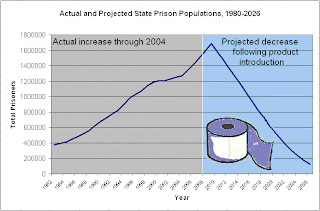* * * * *
Everyone's heard stories of terrible events of human failure: the riots, looting, and general mass hysteria that can overtake an everyday, otherwise law-abiding member of any civilized culture. Wikipedia calls it 'herd behavior' and lists dozens of synonymous references, including bandwagon effect, crowd psychology, mob rule, swarm intelligence, and spontaneous [dis]order. But whatever anyone calls it, regardless of whether or not they've ever been caught up in it, everyone understands how it works.
I've run across a similar phenomenon that only requires a single person, and it works in a manner very similar to what we already understand. I'm calling it the One-Man Mob Mentality, or OMMM. It begins with a person being mildly annoying. If someone is grossly annoying, OMMM will not set in because any behavior that is obviously out of order will immediately draw attention to social boundaries no matter how vague or subtle. When the social offense is obvious, it is reacted to without acceptance. In order for OMMM to occur, it is important that no clear lines are crossed, and that annoying behavior is accepted on at least a probationary basis.
Now, anyone over age 10 who's ever encountered another human being will tell you that folks can be annoying, and once a person has annoyed you, you begin to make certain allowances for them. Like a rude person in a crowd, you simply start moving out of their way as they approach. Because, as Frost wrote, good fences make good neighbors, good manners dictate that we simply put up with the things some folks dish out, and therefore pretend not to be annoyed at the small things people will sometimes do.
Before I go any further, let's put this right out there: everyone has benefited from this social tendency at one time or another. Every first impression makes use of this unspoken practice. Everyone has, at one time or another, depended on exactly this reaction by others to something they unwittingly say or do, or don't realize is offensive or disruptive.
A critical part of this human interaction is the understanding that everyone does it, on both sides, and so paying attention to what you might do that mildly annoys others becomes very important. It's how you give room back. By this constant give and take process, an equilibrium can be formed between two individuals, an individual and a group, or even a convergence of several groups. As each member gives and takes to find his or her place in a micro-society such as the workplace, a dinner table with strangers, a line for concert tickets or the Sears checkout, or even a family welcoming new members, they learn to put up with each other in a very necessary way.
And that, I think, is exactly why we react that way to others when we're mildly annoyed with them. It's a big world. If we don't make some room for each other, we eventually start killing each other.
So as we move through our day-to-day interactions with each other, we do make small bits of room for those people who we have yet to understand, or at least build a tolerance or appreciation for. Sometimes, however, this process doesn't come to its logical end. Sometimes, it cascades into a catastrophic loop of insanity that makes us want to tear someone's arms out. This is OMMM, and this is how it happens.
Small annoyances that do not push the envelope are tolerated. However, instead of participating in the mutual give-take process, the annoying person doesn't return that favor of giving a little back, curtailing the annoying behavior or at least making up for it with something likable or (in the absence of anything likable) respectable. (This could be a sense of humor, a willingness to help or learn, any amount of humility, or some kind of expertise that applies to the group.) A first offense is treated as an additional mild annoyance, and more space is usually afforded to the annoying person, usually with the same reaction. Occasionally, the Annoyer can not only fail to respond in a way that will gain his or her acceptance, but make it worse with a sense of entitlement. This usually manifests by reacting as though the social space made for him or her by others is deserved, and need not be either acknowledged or returned in any way. (People with Ph.D's are infamous for this social flaw*.)
Once the series of small annoyances begins without any return, we start to build a case for disliking everything else the person does, even if, when others do it, it is in no way annoying. Examples can be the way someone walks, wears their hair, writes or says a phrase, engages in a habit, or fidgets. In this way, that original list of annoyances that we made room for becomes like a mob, driving us in a way that only chanting and mass hysteria can. Our brains rail for any response, and before long, we realize we've crossed way into the space that defines the lines of acceptable boundaries, and beyond. It is here that we find ourselves in that virtual riot, abandoning all good social sense, looting anything that might have once been salvaged in the relationship between ourselves and the Annoyer. This, my friends, is the One-Man Mob Mentality.
* This remark does not apply to any of the wonderful doctorate-holding people with whom I share my work day, or may at one time have been related to. Thag you very buch.
